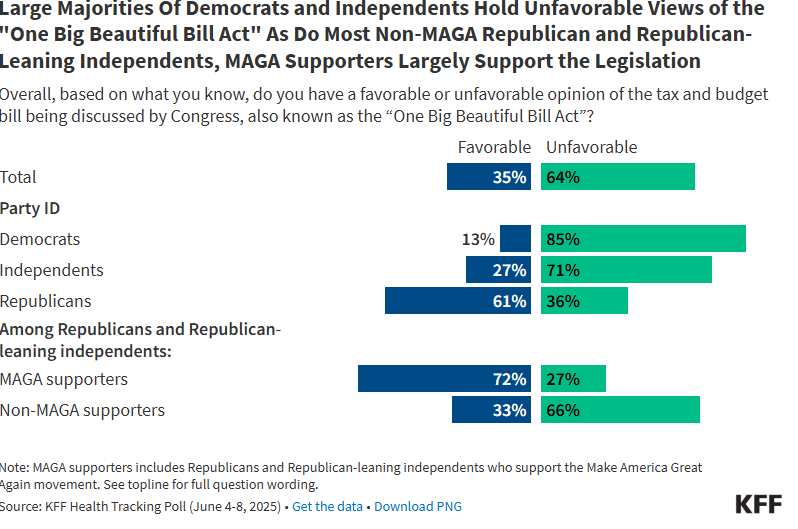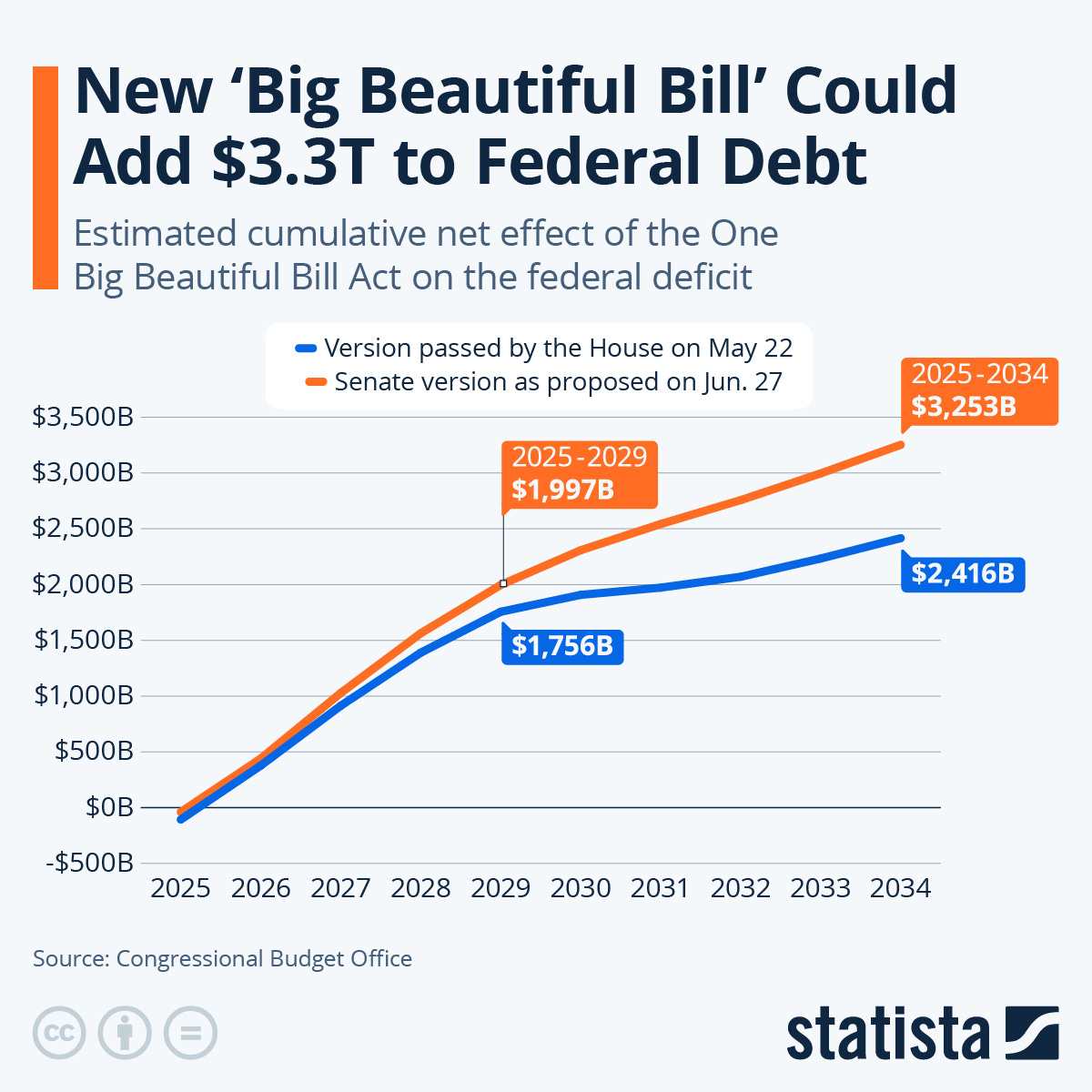When I served in the Arizona State Senate in the 1990’s, in assessing the political fortunes of a bill we (Democrats) opposed, we always applied to the truism that “Moderate Republicans always cave.” To be fair, when I was serving, there were exceptions to this rule. Sue Grace, Susan Girard, Roberta Voss and Bill Mundell come to mind—but notably all have since left the Republican party. Still, this truism still had predictive power. The passage of the Big Beautiful Bill last week showed that this truism worked in Congress as well. Moreover, we can now add a new truism—”Fiscal hawks always cave.”
So this disastrously bad bill passed. What now? What is the political impact? What should we do?
As G. Elliot Morris has written, this is a stunningly unpopular bill. As he points out, this Bill is one of the most unpopular acts in recent history with only the failed effort to repeal Obamacare in 2017 getting worse numbers.
Moreover, even a sizable number of Republicans oppose the Bill. In a KFF poll, fully 36% of Republicans opposed the Bill. Even 27% of MAGA-supporters opposed the Bill.
So does this mean passage of the Bill is a big political win for Democrats? Not necessarily.
First, when voters vote in the 2026 midterms they will generally be influenced by what is actually happening in their lives. Most voters don’t follow the ins and outs of legislation, and as a result they instead focus on what is happening in their lives. Is it getting better or worse? Have they been helped or hurt by policy changes? In 2026, very few voters will see any change in their lives as a result of the Bill.
For the most part, in 2026 the changes in this bill will not yet affect many people. The extension of the tax cuts simply keeps the status quo so voters won’t see any changes in their taxes. The Medicaid cuts don’t begin until 2027—after the Midterms.
Second, while the Bill is largely disfavored by Americans, some provisions are actually popular. The Washington Post-Ipsos poll shows strong support for several provisions in the Bill:
That said, this polling showed some nuance. While a small majority of those polled supported work requirements for Medicaid, support drops significantly when told that these changes will result in millions of Americans losing health coverage.
Despite this, I think there are reasons to believe that the Bill could have political impact on the Midterms—if Democrats get their act together.
First, while the Medicaid cuts don’t take effect until 2027, both States (who will need to adjust their Medicaid budgets because of reduced provider taxes) and Hospitals (who will be facing severe financial loss in 2027) may well take action before 2027. This is because they will need to take action now to avoid disaster in the future. As the Commonwealth Fund explained:
A reduction in federal funding for Medicaid expansion — one of a number of policy changes that Congress is considering — could cause significant coverage losses. For hospitals in Medicaid expansion states, these cuts could lead to a 19 percent decline in operating margins, on average. Safety-net hospitals could be disproportionately impacted, as they treat a higher share of Medicaid and low-income patients. These facilities could see operating margins reduced by an average of 56 percent — and even more in certain states and rural areas. These adverse outcomes will affect not only Medicaid patients but also the entire community served by these hospitals, as lower revenues and increased uncompensated care could force hospitals to reduce staff or eliminate services.
Given the magnitude of this impact, we would expect hospital and community centers to make changes now—and not wait until 2027. Indeed, one hospital in rural Nebraska has already announced that it will close its doors due to anticipated federal budget cuts to Medicaid.
The political effect of these closures likely would be very localized, but nonetheless potentially significant. If this happens to many hospitals, it could have more statewide and national political effect as well.
Second, the huge increase in immigration enforcement funded by the Bill—which will largely occur before the Midterms—could also have an impact on the Midterms. As I noted in a previous post, there will be truly massive increase in immigration enforcement as a result of the Bill:
The specifics are even more startling. The overall ICE budget would triple by 2028 and ICE Enforcement and Removal Operations would nearly quadruple. The detention capacity would increase four-fold.
The Trump Administration seems confident that enhanced immigration enforcement is a political winner, but I have a different assessment. While a majority of Americans support enforcement of the immigration laws in the abstract, this support does down sharply when faced with real world enforcement. We saw this clearly during the first Trump Administration when children were separated from their parents. Support for Trump’s immigration policies cratered.
We are already starting to see great discomfort with recent ICE arrests and aggressive enforcement, and a massive increase in ICE enforcement actions will likely be even more unpopular. A Pew poll from last month is already showing this discomfort:
The immigration enforcement spending increase in the Bill got very little attention during the debate, but it could well end up being the most politically important aspect of the Bill during the Midterm elections. this will be the case if the American people become increasingly uncomfortable—and even outraged—at even more aggressive ICE enforcement operations.
So what should we—the opposition—be doing?
First, it is important to recognize that we are already engaged in a contest to “frame” the Bill in the minds of the American people. We can expect the Administration to use the full resources of the federal government to influence how Americans view the Bill. Indeed, my email inbox already includes an email from the Social Security Administration touting the Bill as a huge win for seniors.
The email lies about the Bill, by the way. It claims—falsely— that the Bill “includes a provision that eliminates federal income taxes on Social Security benefits for most beneficiaries, providing relief to individuals and couples.” The Bill includes no such provision. We should expect further efforts to “message” the bill from Republicans.
We—all of us—need to engage in this messaging battle. Engage with friends and family. Write letters to the editor. Support your local politicians who are engaged in this battle. Feel free to copy and paste anything I have written on this bill.
While there is much that we can say, I think the most powerful message is a very simple one: this bill funds a huge tax cut for the wealthy by taking away health care and food stamps from poor and moderate income Americans.
And for your budget hawk friends and family, the effect of the Bill on the debt can be a powerful message.
Second, we should try to discuss the effect of the Bill at the local level. The Democrats need to identify as specifically as possible the impact at the local level. How many people in the congressional district or State will lose Medicaid? What is the impact on local hospitals? Are any hospitals in danger of closing. The party must then get these details out to the people through all means possible. And each of us should aid in this effort.
Finally, if I am correct that the American public will not stomach the massive increase in ICE raids, arrests and detentions that are coming our way, we should not shy away from challenging massive deportation. This is not a winning issue for Trump—but only of we are not fearful of speaking out. As we learned from the Abrego Garcia case, talking about immigration is not the loser issue for Democrats that many have feared.
We lost the battle. The Bill passed. The political fight is still ongoing and we can win.











